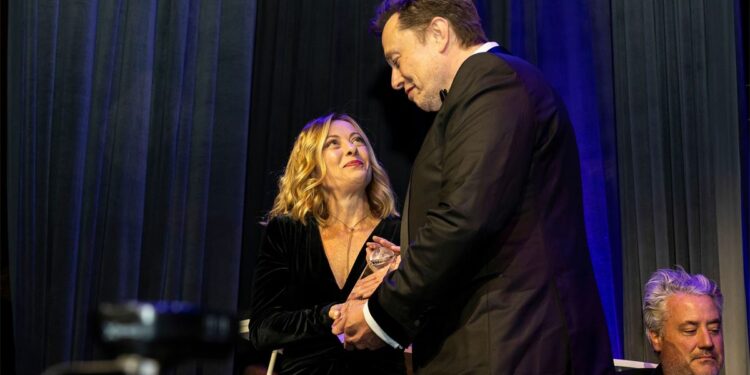With the French and German governments currently in tatters, it may fall to the EU’s third-largest economy to lead transatlantic relations when Donald Trump returns to the White House.
Prime Minister Giorgia Meloni – with her broad political alignment with Trump, her good relationship with his key backer Elon Musk and her good standing with other European leaders – is well placed to become the bloc’s so-called Trump-whisperer for his second term.
The alignment isn’t perfect. At only 1.5% of GDP, Italy’s defence spending is one of the few failing to meet NATO’s 2% goal. Trump has rarely hesitated to use that metric to complain of “being taken advantage of” by allies.
That makes Italy “the only large European ally” short-changing its military, Nathalie Tocci, a former adviser to EU foreign affairs high representatives and now the director of the Istituto Affari Internazionali (IAI), tells The Parliament.
Trump’s transactional approach to politics means he could overlook this shortcoming if he is more broadly aligned with Meloni. Her position as a right-wing leader at the heart of the EU establishment could override all other considerations.
“It may not be as much of a problem because of the affinity that she has with Trump,” Luigi Scazzieri, senior research fellow at the Centre for European Reform, tells The Parliament. “Maybe he won’t pick on her as badly as he would if it were a country that had a left-wing leader.”
European dynamics
Meloni is still broadly inside the EU tent. That’s a big contrast to Hungary’s Prime Minister Viktor Orbán, whose friendliness to Russia’s Vladimir Putin and illiberal behaviour at home have made him an outcast in EU politics.
“What also matters is your credibility among your European partners,” Jörn Fleck, director of the Atlantic Council’s Europe Centre, which awarded Meloni with its Global Citizen Award in 2024, tells The Parliament. “Orbán playing any sort of intermediary role, just because of his good connections with the Trump world, is really far-fetched.”
More centrist figures are thin on the ground. French President Emmanuel Macron, who positioned himself as a bridge to Trump during his first term, is preoccupied with internal political struggles. Polish Prime Minister Donald Tusk, though aligned with Trump on defence spending and migration, has spoken out against his ambivalence towards Ukraine.
Meloni’s home front
“Meloni wants to be the leader. And now that Trump is elected, she really wants to show that she’s able to have a direct dialogue with Trump,” Jean-Pierre Darnis, a professor of Franco-Italian relations at Côte d’Azur University in Nice, tells The Parliament. “She’s into power.”
Appearing powerful on the world stage could consolidate her power at home. Italy’s large trade surplus could benefit from a good relationship with Trump. The president-elect has proposed imposing tariffs on imports, including a baseline tariff on 10% of all foreign-made goods, a targeted 60% tariff on Chinese goods and a 100% tariff on all imported cars.
Italy’s €42 billion trade surplus with the US puts the country “in a particularly vulnerable position,” says Tocci. “As a true nationalist, she will ultimately be whispering for her own national interests,” she said.
Hanging EU partners out to dry, however, could come back to bite. Being part of a single market means a rising tide has to lift all boats to raise any at all.
“A bad relation between Germany and the US would affect Italy, and the French, and the Spanish. It’s a collective sum game,” says Darnis.
In Musk we trust?
Another string to Meloni’s bow is her relationship with Elon Musk, a key Trump ally. Their relationship was originally business-focused – they negotiated coverage for Musk’s orbital internet service Starlink to provide services in rural Italy. A series of meetings in 2023 and 2024 cemented a friendship between the two, founded on shared politics and an appreciation of the Roman Empire.
Since then, the French-Italian venture Telespazio, led by Italy’s defence company Leonardo, signed an agreement with SpaceX, which owns Starlink, to fully integrate their services in its global satellite network.
“A good relationship with Musk could put Italy in the loop with IT investments, which is a concern in Italy. It also gives points to the EU, which is the main market for digital technology consumers,” says Darnis.
Meloni’s opponents have criticised her close relationship with the tycoon. President Sergio Mattarella said that Italy “can take care of itself” after Musk called the Italian judiciary an “unelected autocracy” on his social media platform X.
Without explicitly calling out Musk, Mattarella has also taken aim at “economic operators whose financial power today surpasses that of many medium-sized states” and who “manage essential services nearing monopolistic conditions.”
Meloni has brushed aside these criticisms. During senate debate, she said she “can be friends with [him] while also being the head of the first government that in Italy passed a law to regulate private activities in space.”
For Meloni to cash in on her cosy relationship, however, she will need to bring home the bacon not just for herself or Italy, but all the EU. Her counterparts will be watching to see if she can — and wants to.
“If someone wants to play some sort of intermediary role, then you have to have credibility on both sides,” says Fleck.
Source link : http://www.bing.com/news/apiclick.aspx?ref=FexRss&aid=&tid=6773e28148874d618cab1dc67c9c1323&url=https%3A%2F%2Fwww.theparliamentmagazine.eu%2Fnews%2Farticle%2Fin-a-rightleaning-eu-meloni-poised-to-be-bridge-to-trump&c=16065362943080293728&mkt=de-de
Author :
Publish date : 2024-12-31 04:20:00
Copyright for syndicated content belongs to the linked Source.


